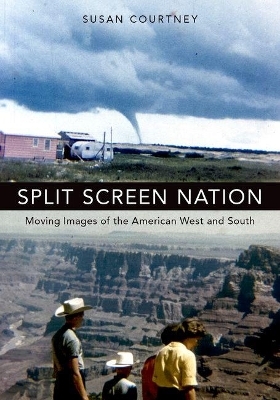
Split Screen Nation
Oxford University Press Inc (Verlag)
978-0-19-045996-3 (ISBN)
Split Screen Nation traces an oppositional dynamic between the screen West and the screen South that was unstable and dramatically shifting in the decades after WWII, and has marked popular ways of imagining the U.S. ever since. If this dynamic became vivid in Quentin Tarantino's Django Unchained (2012), itself arguably a belated response to Easy Rider (1969), this book helps us understand those films, and much more, through an eclectic history of U.S. screen media from the postwar era. It deftly analyzes not only Hollywood films and television, but also educational and corporate films, amateur films (aka "home movies"), and military and civil defense films featuring ¨tests" of the atomic bomb in the desert. Attentive to sometimes profoundly different contexts of production and consumption shaping its varied examples, Split Screen Nation argues that in the face of the Cold War and the civil rights struggle an implicit, sometimes explicit, opposition between the screen West and the screen South nonetheless mediated the nation's most paradoxical narratives-namely, "land of the free"/land of slavery, conquest, and segregation. Whereas confronting such contradictions head-on could capsize cohesive conceptions of the U.S., by now familiar screen forms of the West and the South split them apart; offering convenient, discrete, and consequential imaginary places upon which to collectively project avowed aspirations and dump troubling forms of national waste. Pinpointing some of the most severe yet understudied postwar trends fueling this dynamic-including non-theatrical film road trips, feature films adapted from Tennessee Williams, and atomic test films-and mining their potential for more complex ways of thinking and feeling the nation, Split Screen Nation considers how the vernacular screen forms at issue have helped shape how we imagine not only America's past, but also the limits and possibilities of its present and future.
Susan Courtney is an associate professor of Film and Media Studies and English at the University of South Carolina. There she also co-founded the Orphan Film Symposium and has directed the program in Film and Media Studies. She is the author of Hollywood Fantasies of Miscegenation: Spectacular Narratives of Gender and Race, 1903-1967 (2005).
List of Illustrations
Preface
Acknowledgements
About the Companion Website
Part 1: Projecting Region, Imagining Nation
Teaser (Hollywood): Easy Rider Calls For a Genealogy
Introduction: Split Screen Nation
Part 2: Remapping the Nation on Multiple Screens
Teaser (16mm & Archive.org): Camera Road Trip
Chapter 1: Screen Maps for Model Citizen- Spectators
Chapter 2: Frontier Vistas and Plantation Sutures: Hollywood Forms of the American Paradox
INTERSTITIAL TEASER (Multimedia): "John Wayne" versus "Tennessee Williams"
Part 3: The Leaky South
Teaser (TV): Enjoying the "Southern Decadence Blues" with Hugh Hefner
Chapter 3: How the South Became Sexually Perverse in the Civil Rights Era
Part 4: The Empty West
Teaser (Media Saturation): Robert Frank's Postcards from the Edge
Chapter 4: Expanding Views of a Filmic Proving Ground
Epilogue: Walking/Looking into the Toxic Cloud
Notes
Index
| Erscheinungsdatum | 12.03.2017 |
|---|---|
| Zusatzinfo | over 400 screen stills |
| Verlagsort | New York |
| Sprache | englisch |
| Maße | 257 x 183 mm |
| Gewicht | 774 g |
| Themenwelt | Kunst / Musik / Theater ► Film / TV |
| Geisteswissenschaften ► Geschichte ► Regional- / Ländergeschichte | |
| ISBN-10 | 0-19-045996-4 / 0190459964 |
| ISBN-13 | 978-0-19-045996-3 / 9780190459963 |
| Zustand | Neuware |
| Haben Sie eine Frage zum Produkt? |
aus dem Bereich


